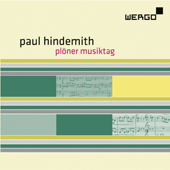
ESSENTIAL RECORDINGS

Try and imagine how it must have been engaging and exciting, back in the 1930s, not only for the school children but for everyone involved, to commit to and undertake
such a large scale musical production as the Plöner Musiktag (The Music Day at Plön). No televisions, no stereos, no ipods, no video
games, etc ... you had to create your own entertainment. To hear new music, you had to travel long distances or partake in its production. It is in that light, in that spirit,
that this educational work by Paul Hindemith should be viewed and appreciated. To the critics who have dismissed it as non-interesting music, I have
to say; "You've missed the point!" It was not written to be on par with a Beethoven symphony, far from it. It was conceived as an educational and motivational tool to
promote and encourage musical training and musical performance in school children. And based on that premise, it is very interesting music indeed.
The Plöner Musiktag was a festival that took place over three days at the boarding school in Plön, Germany, on the 20th of June 1932. The plan was to get all the children,
over the first two days, to learn and rehearse their parts for the orchestra or choir, and then perform in the actual festival on the third day. Every effort was made to
include everyone, regardless of their musical aptitudes or training. Even the unmusical children were given a spot in the percussion group. To participate and collaborate
in such an event must have left an indelible impression on everyone involved, and even served as the impetus for some to follow musical careers.
Taking its cue from medieval German tradition, the festival would begin early in the morning with all the brass instruments playing from the towers announcing the start
of the festivities. During the meal that was served at noon, Tafelmusik (Table Music) was played. In the afternoon, the main part of the work was performed.
A Cantata with the subtitle 'Admonition to youth to apply themselves to music', based on a text by the 16th century composer,
Martin Agricola, which tied into musical education. The day would end with an Evening Concert that included various groups and ensembles from duets and recorder trios, to
pieces for full orchestra.
Do not think for a second that because this music was composed to be played by school children that it is simple, repetitive and easy to play. Paul Hindemith did not pull
any punches in the score. After all, it was meant to stimulate and challenge the mind. Not to bore the children away from classical music. It even makes for a stimulating,
challenging and entertaining listen. Paul Hindemith's unique notation layout and harmonic system is unusual, but engaging all the same. The conductor on this recording,
Jobst Liebrecht, hopes that the re-emergence of this work not performed in its entirety since 1932, will force a re-evaluation of music education systems
at all levels. A round of applause also to baritone Dietrich Henschel, the Marzahn-Hellersdorf Symphonic Youth Orchestra and the
people at Wergo for having the vision and conviction that works and efforts like these deserve to come back and set an example for educators of today
to follow and inspire others to follow. Who knows. It might, or rather it should, become the next great cause.
Jean-Yves Duperron - January 2011